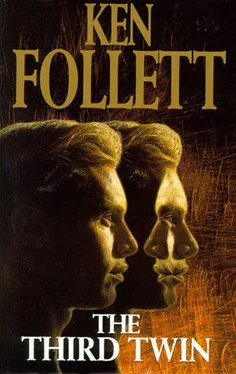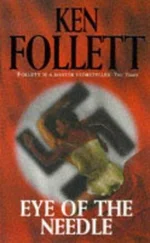“In that case, I’ll take you out.”
The three of them left the room together.
Outside the door Robinson said: “Go get a mop, Pinker.”
Dennis smiled at Jeannie, a long, intimate smile, as if they were lovers who had spent the afternoon in bed together. Then he disappeared into the interior of the jail. Jeannie watched him go with immense relief, but it was tinged with continuing revulsion, for he had her underwear in his pocket. Would he sleep with her panties pressed to his cheek, like a child with a teddy bear? Or would he wrap them around his penis as he masturbated, pretending that he was fucking her? Whatever he chose to do she felt she was an unwilling participant, her privacy violated and her freedom compromised.
Robinson walked her to the main gate and shook her hand. She crossed the hot parking lot to the Ford, thinking, I’ll be glad to drive out of this place. She had a sample of Dennis’s DNA, that was the most important thing.
Lisa was at the wheel, running the air-conditioning to cool the car. Jeannie slumped into the passenger seat.
“You look beat,” Lisa said as she pulled away.
“Stop at the first shopping strip,” Jeannie said.
“Sure. What do you need?”
“I’ll tell you,” Jeannie replied. “But you’re not going to believe it.”
19
AFTER LUNCH BERRINGTON WENT TO A QUIET NEIGHBORHOOD bar and ordered a martini.
Jim Proust’s casual suggestion of murder had shaken him. Berrington knew he had made a fool of himself by grabbing Jim’s lapel and yelling. But he did not regret the fuss. At least he could be sure Jim knew exactly how he felt.
It was nothing new for them to fight. He remembered their first great crisis, in the early seventies, when the Watergate scandal broke. It had been a terrible time: conservatism was discredited, the law-and-order politicians turned out to be crooked, and any clandestine activity, no matter how well intentioned, was suddenly viewed as an unconstitutional conspiracy. Preston Barck had been terrified and wanted to give up the whole mission. Jim Proust had called him a coward, argued angrily that there was no danger, and proposed to carry it on as a joint CIA-army project, perhaps with tighter security. No doubt he would have been ready to assassinate any investigative journalist who pried into what they were doing. It had been Berrington who suggested setting up a private company and distancing themselves from the government. Now once again it was up to him to find a way out of their difficulties.
The place was gloomy and cool. A TV set over the bar showed a soap opera, but the sound was turned down. The cold gin calmed Berrington. His anger at Jim gradually evaporated, and he focused his mind on Jeannie Ferrami.
Fear had caused him to make a rash promise. He had recklessly told Jim and Preston that he would deal with Jeannie. Now he had to fulfill that imprudent undertaking. He had to stop her asking questions about Steve Logan and Dennis Pinker.
It was maddeningly difficult. Although he had hired her and arranged her grant, he could not simply give her orders; as he had told Jim, the university was not the army. She was employed by JFU, and Genetico had already handed over a year’s funding. In the long term, of course, he could easily pull the plug on her; but that was not good enough. She had to be stopped immediately, today or tomorrow, before she learned enough to ruin them all.
Calm down, he thought, calm down.
Her weak point was her use of medical databases without the permission of the patients. It was the kind of thing the newspapers could make into a scandal, regardless of whether anyone’s privacy was genuinely invaded. And universities were terrified of scandal; it played havoc with their fundraising.
It was tragic to wreck such a promising scientific project. It went against everything Berrington stood for. He had encouraged Jeannie, and now he had to undermine her. She would be heartbroken, and with reason. He told himself that she had bad genes and would have got into trouble sooner or later; but all the same he wished he did not have to be the cause of her downfall.
He tried not to think about her body. Women had always been his weakness. No other vice tempted him: he drank in moderation, never gambled, and could not understand why people took drugs. He had loved his wife, Vivvie, but even then he had not been able to resist the temptation of other women, and Vivvie had eventually left him because of his fooling around. Now when he thought of Jeannie he imagined her running her fingers through his hair and saying, “You’ve been so good to me, I owe you so much, how can I ever thank you?”
Such thoughts made him feel ashamed. He was supposed to be her patron and mentor, not her seducer.
As well as desire he felt burning resentment. She was just a girl, for God’s sake; how could she be such a threat? How could a kid with a ring in her nose possibly jeopardize him and Preston and Jim when they were on the brink of achieving their lifetime ambitions? It was unthinkable they should be thwarted now; the idea made him dizzy with panic. When he was not imagining himself making love to Jeannie, he had fantasies of strangling her.
All the same he was reluctant to start a public outcry against her. It was hard to control the press. There was a chance they would begin by investigating Jeannie and finish up investigating him. This would be a dangerous strategy. But he could think of no other, short of Jim’s wild talk of murder.
He drained his glass. The bartender offered him another martini, but he declined. He looked around the bar and spotted a pay phone next to the men’s room. He swiped his American Express card through the card reader and called Jim’s office. One of Jim’s brash young men answered: “Senator Proust’s office.”
“This is Berrington Jones—”
“I’m afraid the senator is in a meeting right now.”
He really should train his acolytes to be a little more charming, Berrington thought. “Then let’s see if we can avoid interrupting him,” he said. “Does he have any media appointments this afternoon?”
“I’m not sure. May I ask why you need to know, sir?”
“No, young man, you may not,” Berrington said with exasperation. Self-important assistants were the curse of Capitol Hill. “You may answer my question, or you may put Jim Proust on the phone, or you may lose your goddamn job, now which is it to be?”
“Please hold.”
There was a long pause. Berrington reflected that wishing Jim would teach his aides to be charming was like hoping a chimpanzee would teach its young table manners. The boss’s style spread to the staff: an ill-mannered person always had rude employees.
A new voice came on the phone. “Professor Jones, in fifteen minutes the senator is due to attend a press conference to launch Congressman Dinkey’s book New Hope for America.”
That was just perfect. “Where?”
“The Watergate hotel.”
“Tell Jim I’ll be there, and make sure my name is on the guest list, please.” Berrington hung up without waiting for a reply.
He left the bar and got a cab to the hotel. This would need to be handled delicately. Manipulating the media was hazardous: a good reporter might look past the obvious story and start asking why it was being planted. But each time he thought of the risks, he reminded himself of the rewards and steeled his nerve.
He found the room where the press conference was to be held. His name was not on the list—self-important assistants were never efficient—but the book’s publicist recognized his face and welcomed him as an additional attraction for the cameras. He was glad he had worn the striped Turnbull & Asser shirt that looked so distinguished in photographs.
Читать дальше












